
ACM
Special material for highly additive
Lubricants in vehicles
Acrylate rubber
ACM is characterized by remarkable oxygen, ozone and temperature resistance,
which allows it to be used in various demanding environments.
It has good heat and chemical resistance, but shows limited resistance to hydrolysis
and increased water intake. The resistance to mineral oils, especially when compared to
Acrylate Ethylene Polyethylene Rubber (AEM), is excellent. This makes ACM a preferred material in the automotive industry, where it is resistant to engine, transmission and automatic transmission oil even at higher temperatures
Chemical structure
Acrylate rubber (ACM) represents an important class of polymer materials that are characterized by
the copolymerization of ethyl acrylate and various acrylates arise, with a small proportion of
Vulcanization-promoting monomers are added. The production is typically carried out by
radically initiated emulsion or suspension polymerization, with crosslinking by diamines,
Fatty acid soaps and peroxides.
Material properties and resistance
-
very good resistance to weather, ozone, heat and chemicals
-
Recommended in contact with oils and lubricants, including highly aggressive additives
-
Has low compression set and good cold properties
-
Mainly used in vehicles construction and motorsport
-
Temperature resistance: -40°C to 160°C
The possible uses of acrylate rubber are diverse and extend beyond the automotive industry. The outstanding properties of ACM and the comparably low costs compared to FKM also make it attractive in other industries, especially when high temperatures and demanding chemical environments occur. flexibility ACM has low flexibility Tear resistance Good tear resistance makes ACM resistant to dynamic and static loads. Wear resistance Good wear resistance for longer life under repeated wear and tear. Suitable for applications with high mechanical stress. Oil and fuel resistance AEM is resistant to many oils, lubricants and fuels, making it a preferred material for gaskets and sealing elements in engines and other mechanical systems. Weather resistance Good weather resistance, minimal aging due to UV radiation. Temperature resistance Acrylate rubber is characterized by excellent temperature resistance, especially when compared to other elastomers. Chemical resistance General resistance to many chemicals, including some acids and bases. ACM can react to polarly charged solvents and certain aromatic hydrocarbons. as well as strong exposure to ozone.
Material hardness and coloring
Adjusting the mechanical properties often requires the use of active fillers such as carbon black.
In terms of hardness, acrylate rubber can be produced in different Shore hardnesses,
to meet the specific requirements of different applications.
ACM is mainly available in black and gray colors.
Industries and applications
The unique properties of acrylate rubber make it a valued material in a variety of industries, including the automotive industry, the oil and gas industry, and other demanding engineering applications where high temperatures, chemical resistance, and ozone exposure are important.
ACM is mainly used to produce components such as engine and transmission seals, turbocharger hoses, O-rings, membranes and hose applications.
Automotive industry Due to their high temperature resistance and oil resistance, seals, O-rings and hoses made from ACM are crucial for use in engines and transmissions. Oil and gas industry Chemical resistance to oils and fuels, combined with high temperature resistance, makes ACM ideal for sealing applications in this industry. Electronics industry Good electrical insulation properties and resistance to environmental influences make ACM cable jackets and seals attractive for electronic components. Medical technology Seals and hoses made from ACM are interesting for medical applications due to their chemical resistance and low toxicity.
Overall, ACM positions itself as a valued elastomer for various industries that require high performance standards
and require a wide range of applications. However, ACM is mainly used in the automotive industry,
where it is resistant to engine, gearbox and automatic transmission oil even at higher temperatures
Material development/compounding
high quality standards for the best durability
Our products should withstand extreme chemical and physical influences
be in long-term use.That's why we always choose the
Material that exactly meets the customer's individual requirements.
For challenging projects, you can rely on extensive expertise
and leave our network of raw material suppliers and application engineers.
We deal in depth with the conditions of use and know materials
develop, which are characterized by a wide variety of properties such as
Heat or cold resistance, weather resistance, media resistance
and long service life.


targeted material selection
Due to the high level of wear and tear on rubberand plastic products, the associated complex repair work and expensive downtime, we clarify all the physical aspects in the first conversation
and chemical influences on the product.
This allows us to offer our customers high-quality products
withoffer the best durability and resistance.
Material optimization
We optimize the physical and chemicalCharacteristics
of the material used or are specifically looking for alternatives,
to provide better resistance to different
environmental influences.
This allows us to identify your product using data sheets,Attempts or external tests to specifically improve the quality.

SBR
Elastomers
TPE
